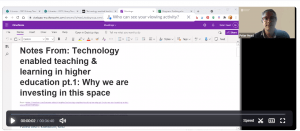Mario Barosevcic has written an interesting article Technology enabled teaching & learning in higher education where he points out the gaps he sees in the Education industry, from the perspective of the Tech Industry.
The CSU/Study Group Study Centre Library & Study support teams got together to have a discussion about this.
Key points that we pulled out of the article to discuss:
- When it comes to the education itself, most universities are the same. Professors create curricula and teach through large lecturers. Teaching assistants help distill and clarify lectures and materials. Students attend lectures, use textbooks and complete homework, assignments and exams required to graduate.
- The student learning experience is often more like a series of disconnected and fragmented experiences. The best students are those that can most effectively navigate all learning roadblocks thrown at them, with limited personalised and tailored academic support.
- Professors often lack formal training and are far behind school teachers, where there are clear qualifications and prerequisites.
- Solutions have required too much behavioral change or have offered too little impact
- Replacing the existing university Learning Management System (LMS) is an almost impossible task given how deeply engrained it is in the system and how long average contracts are. Whilst many have predicted the demise of publishers for years, no one has yet managed to replace them.
- universities have paraded the streets for decades showing off their untouchable, long established academic offers, while building moats around them through investments in flashy campuses.
- 28% of students would prefer their assessments and exams to continue to be delivered in person and 71% of students find one or more aspects of their courses should be delivered online.

